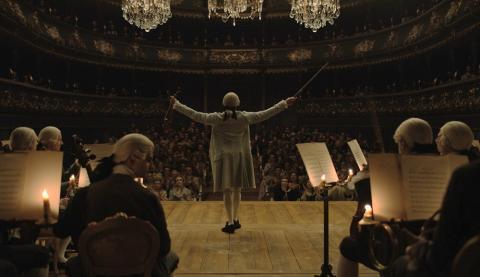
How do you create a revealing and intimate portrait of someone who is forever playing a self-created role? How do you find something that is honest in a character who is composed of onion layers of artifice? It’s a problem with which writer-director Mary Harron wrestles in her latest film, an account of a late period in the life of the surrealist artist Salvador Dalí, and one that she fails to resolve entirely. The Dalí persona, the film argues, was as much an artistic creation as any of his paintings. Dalí was something to be experienced rather than someone to be known.
This is all very well, but it doesn’t exactly give Ben Kingsley much to get his teeth into in the central role. The way this film approaches him, Dalí is a character who is worn, like a velvet smoking jacket and a jewel-encrusted fez, rather than someone who can be explored and inhabited. Kingsley is persuasive, in as much as he plays the ostentatious role that Dalí created for himself at least as convincingly as the artist himself did. But the glimpses of the man beneath all the showboating are rare.
It’s not the first time that Harron has tackled a real-life figure whose self-created character works as a kind of carapace that conceals the true self. The same could be said of Anna Nicole Smith, the subject of Harron’s 2013 TV movie, or of the 1950s pinup model Bettie Page. In both cases, the faultlines of emotional insecurity offer glimpses of the women behind the carefully constructed public images. With Dalí, it’s rather more complicated, perhaps, the film suggests, because there is no one single Dalí, but rather a distracting mosaic of slightly different variations on the theme of Dalí.
Harron uses the device of Dalí’s wide variety of signatures as a way to express this idea. “It’s as though you become a new person each time you paint,” says James (The Summer I Turned Pretty star Christopher Briney), the star-struck gallery assistant who acts as our window into the world of Dalí. Interestingly, this idea of multiple Dalís is also central to the French director Quentin Dupieux’s recent film about surrealism’s most famous son, titled Daaaaaalí! In this case, the movie takes a more playful approach by casting several actors in the central role.
More effective is Harron’s depiction of the artist as a catalyst, someone who sparks a decadent creative chaos wherever he goes. The title, Dalíland, makes him sound a bit like a niche-interest theme park, and in fact, that’s not so very far removed from the truth. The use of the fictionalised character James as an observer, someone who experiences Dalí as one might a piece of interactive theatre, is productive, up to a point. Other, more sophisticated members of the inner circle get to explain Dalí’s peccadilloes to James, the newbie in Dalíland, filling in some useful background details for the audience at the same time. The problem is that Harron assumes James is interesting as a character in his own right, which unfortunately he isn’t.
But then anyone would seem a little insipid when placed alongside Dalí’s larger-than-life entourage, which includes model and muse Amanda Lear (Andreja Pejić), rock star Alice Cooper (Mark McKenna) and Dalí’s demanding wife, Gala (Barbara Sukowa, excellent). Depicted here as a monstrous narcissist, Gala perpetrates sexual assaults on men who please her and common or garden physical assaults on those who don’t. She is, for better or worse, a galvanising force in Dalí’s life, berating, goading and torturing him until he works and earns to her satisfaction (“I will not be poor,” she wails, in the $20,000-a-month suite that they rent each winter at the St Regis hotel in New York).
If Dalí’s personality is tricky to pin down in the film, his work is even more elusive, not least because the production evidently couldn’t afford the rights to show any of it. In similar circumstances, the most effective artist biopics have allowed the essence of the work to bleed into the visual design of the film: the inventive animated feature Loving Vincent, for example, or John Maybury’s portrait of Francis Bacon, Love Is the Devil, which so vividly evoked the grotesque beauty of his paintings. The great missed opportunity of this film, with its glossy, handsome design and cinematography, and its genteel orchestral score, is how polite and unadventurous it is – something that could never be said of Dalí himself.












